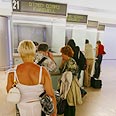
I’ve noticed something unusual when I travel to Israel as a Palestinian.
Besides the fact there are no signs in Arabic at Ben-Gurion Airport, they always let me in. It’s leaving Israel that’s the tougher experience for me.
That doesn’t mean Israeli security doesn’t gives me the third degree when I arrive. Even before my foot touches the tarmac as I disembark from the plane, a beautiful Israeli security officer always greets me with the same greeting, “Would you follow me?”
“Sorry, ma’am. I’m married,” I reply. They never catch the humor. She leads me to a special line in the airport where a custom officer scrutinizes my American passport.
Raymond doesn't sound Arabic
“What’s your name?” the female airport security officer asks.
“Raymond,” I reply.
The officer looks perplexed. “Raymond” isn’t Arabian sounding, and prompts a follow-up question.
“What’s your father’s name?”
“George,” I reply, holding back a smirk.
Still surprised, she digs deeper. “What’s your grandfather’s name?”
“Saba,” I mumble. I might as well have said “Yasser Arafat.”
“Ah hah!” She says with a satisfied sigh on her face. “Please step to the side. An officer will take you to Room B.”
A few cavity searches later and a double check to make sure my name is not on the membership list of known terrorist organizations like the ISM, the PLO or “Jews for Jesus,” Israeli security usually lets me enter Israel with few other problems.
Leaving is harder
I limp my way to the baggage claim. My bags are the easiest to spot. They’ve usually been removed from the baggage claim conveyer belt and are surrounded by the bomb squad.
Entering Israel. That’s the easy part.
It’s leaving that’s tough.
The first security inspection occurs on the side of the road from Jerusalem to Tel Aviv. Israeli soldiers can spot an Arab in a cab faster than a white cop can pull over a black driver in an American suburb. The soldiers wave my cab over, guns readied. And my luggage and papers are slowly picked apart.
They don’t care about my name. They want to know where I have been.
The next inspection occurs as the same cab tries to enter the airport. Ethiopian soldiers pull me over at the gate when they see my Arab face. I sit in the cab, meter running, as they, too, pick through my luggage and papers.
The real delay is at the airport.
In America, I have to get to the airport at least two hours before an international flight. In Israel, I had better arrive five hours early. They don’t even have to direct me any more, I just walk to the right side after I enter the terminal and stand by the special, behemoth X-ray machine.
Practicing English
One time, I went to Israel with my wife, who is Jewish and looks the part. When the police pulled me out of line, she started yelling. I calmly said to quiet her down, “Honey. The more you yell the worse it's going to be for me.”
My wife replied with a sly smile, “Why do you think I’m yelling?”
Soon, I find myself in the "other line,” where they ask me all kinds of questions. I’m not sure if they are just overly curious, or need to practice their English. They miss nothing, other than a few adjectives, nouns and verbs.
“Who you see? Where you go? What you do? Do have tourist pamphlets? Documents? Computer. Weapons of mass destruction?”
Does anyone ever answer, “Yes, ma’am. I have some weapons of mass destruction in my carry on bag here?”
I try to be funny.
“I am a weapon of mass destruction,” I reply. “I just had a large bowl of tabouli before I left for the airport and it will not be pleasant.”
“Ah. A comedian!” security observes.
They unpack everything. And they even put my laptop computer through a special X-ray machine off to the side.
“Can you load file for me?” one inspector asks.
“Sure,” I reply. “How about this one, "The Protocols of the Elders of Zion?" I got it when I visited the PNA offices. Care to read it?”
My bags go in one end of the X-ray machine and out the other. Again. And again. And again.
“Any chance you overcooked my bags?” I ask.
“Overcooking?” the inspector smiles. “I never hear that one.” She scribbles something down in her little notebook.
Great. In addition to accusing me of criticizing Israel’s government, they’re going to say I called Israelis “bad cooks,” too.
When it’s finally over, the security guards are always polite. They refold my clothes, carefully collect the loose pieces of my laptop, and laugh hysterically when I ask if my film will be OK.
Israel always has me leaving with a smile that glows. A radiant greenish glow, to be exact.
Ray Hanania is a Palestinian-American writer, peace activist and standup comedian who was raised in Chicago. He is from a Christian family; his father is from Jerusalem, his mother from Bethlehem. His wife and son are Jewish. He is the founder of "Comedy for Peace." This column is exclusive for Ynetnews















